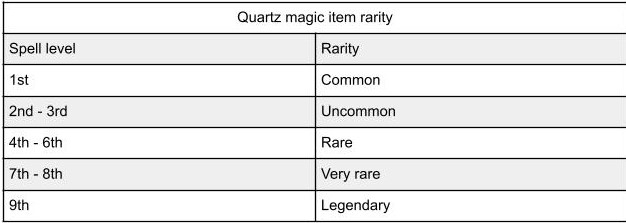A friend of mine has been planning to run a game based on the trails game series and has proposed some interesting rules for the arcus units.
I realize the amount of crossover in the people interested in 5e and trails is probably very small so let me explain. An arcus unit is a small device that allows humans to channel the same magic monsters do. The unit uses small marbles called quartz, refined from rare minerals called sepith, to grant these powers. This is almost the only way to use magic as a human.
Charge points and prepared spells:
- Use the DMGs spell points optional rule but call them charge points.
- Every character can prepare up to six spells by placing quartz into their arcus units. These quartz can be exchanged for others that the character possesses upon completing a short or long rest.
- Quartz are magic items and not tied to any specific class, classes do not learn spells on their own and are unable to prepare them without quartz.
- The maximum spell level a character can prepare is the highest spell slot they would have at their level. For classes that do not normally cast spells they follow the same third spell progression as eldritch knight and arcane trickster.
Quartz magic item rarity

Casting rules changes:
- Classes that do not usually cast spells use the same third progression as eldritch knight and arcane trickster (including charge points) however unless they are; eldritch knight, arcane trickster, or four elements they do not add their proficiency bonus to their spell attack modifier or spell save DC. for these classes they choose weather their casting ability is; intelligence, wisdom, or charisma
- After casting a spell the character enters a delay period
Delay period:
After casting a spell there is a delay before it takes effect, during this time they are concentrating on the spell, if they lose concentration before the spell takes effect then the spell fails.
The delay period depends on the spell level and caster status of the character. Once calculated as described below, create a marker on the initiative that is the character’s initiative minus the delay, that marker is when the spell takes effect.
Calculating delay:
-
Non / third caster Delay = 2x spell level
-
Half caster Delay = spell level
-
Full caster Delay = 1/2 spell level
Very cool. I had a similar idea for my homebrew setting where humans needed special minerals, kind of similar to this setting’s quartz, to cast spells.
In my setting, the mineral worked the same way as the vancian system, ie the spellcaster had to store a spell inside the mineral ahead of time. To store higher level spells, higher rarity minerals were required.
That’s interesting. In your world are there other intelligent races / species? And do each of them use magic differently or are humans an only exception?
It only applied to humans (except for Warlocks and Sorcerers), which was at the root of the main conflict of the campaign.
The minerals were highly sought-after by humans, of course, but most of the mines were situated in non-human countries, which exacerbated the problem, because non-humans pretty much had full control over the market and would sell the minerals at very high prices.
For this reason, the human empire was devoting a huge speck of its balance to import the minerals, but eventually decided that it wasn’t worth it and ended up waging war against its neighbours to appropriate some of the mines.
Inside the empire there was social friction as well, as the low-grade minerals were commonly found everywhere, while higher rarity minerals were usually appropriated by the army or people rich enough to buy them. Despite this, everyone was paying exorbitant taxes to finance the war, and some lost their relatives in it. Common people were paying the price, but were not seeing any benefit.
The players were thrown into this huge mess and were asked to pick a side.
-
Is the empire right in waging war? They started it, but magic was important for the well-functioning of society and the neighboring countries were strong-arming them by raising the price of the most sought-after thing in the world.
-
When civil war erupted, which side were they on? Common people wanted the minerals to be available to everyone, especially because they were the ones shouldering most of the cost (both in terms of money, and human lives) but the harsh truth was, there just wasn’t enough for everybody. The players could choose to take Robin Hood’s side and steal some minerals for the commoners, but that meant that soldiers on the border could find themselves without magic on a battlefield where their enemies could cast fireballs left and right.
Oh I’m really sorry I spaced on this. I got a little busy and need to prepare for a game I was invited to play.
That sounds really interesting though. It sounds like it would be a game full of really hard decisions. I don’t know if you are into video games or not but if you are you should check out triangle strategy, it’s got the same kind of political stuff going on as this setting you made.
Anyway, thank you for this interaction.
Hey, don’t worry, we all have a life outside of Lemmy :)
Anyway, thanks a lot for the recommendation! I used to be really into video games. Not so much recently, but I still play something every now and then when I need some time alone to space out a bit and forget the outside world. I actually had Triangle Strategy on my wishlist for a long time, and now you made me a bit curious about trying it out. I’ll probably get it as soon as I see it on sale!
-


